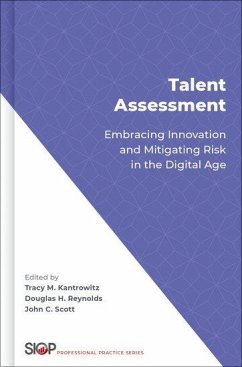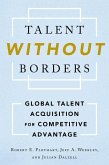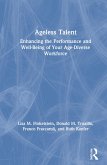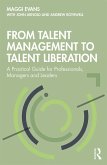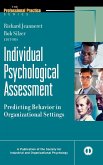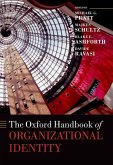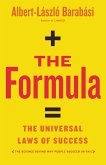Talent Assessment
Embracing Innovation and Mitigating Risk in the Digital Age
Herausgeber: Kantrowitz, Tracy; Scott, John; Reynolds, Douglas H
Talent Assessment
Embracing Innovation and Mitigating Risk in the Digital Age
Herausgeber: Kantrowitz, Tracy; Scott, John; Reynolds, Douglas H
- Gebundenes Buch
- Merkliste
- Auf die Merkliste
- Bewerten Bewerten
- Teilen
- Produkt teilen
- Produkterinnerung
- Produkterinnerung
This book reviews the latest advances in technology-enabled assessment in the workplace. Featuring chapters on key trends and innovations in assessment, the volume covers advances in the foundational science of assessment, technology-related innovations, updates to regulations, principles, and standards, and assessment for development. Including a variety of case studies that describe talent assessment in action and how organizations of varying sizes develop and implement assessment programs, this book is ideal for practitioners and academics in the field.
Andere Kunden interessierten sich auch für
![Talent Without Borders Talent Without Borders]() Robert E PloyhartTalent Without Borders61,99 €
Robert E PloyhartTalent Without Borders61,99 €![Ageless Talent Ageless Talent]() Lisa M FinkelsteinAgeless Talent182,99 €
Lisa M FinkelsteinAgeless Talent182,99 €![From Talent Management to Talent Liberation From Talent Management to Talent Liberation]() Maggi EvansFrom Talent Management to Talent Liberation163,99 €
Maggi EvansFrom Talent Management to Talent Liberation163,99 €![Individual Psychological Assessment Individual Psychological Assessment]() Individual Psychological Assessment92,99 €
Individual Psychological Assessment92,99 €![The Oxford Handbook of Organizational Identity The Oxford Handbook of Organizational Identity]() The Oxford Handbook of Organizational Identity217,99 €
The Oxford Handbook of Organizational Identity217,99 €![Oxford Handbook of Organizational Climate and Culture Oxford Handbook of Organizational Climate and Culture]() Benjamin SchneiderOxford Handbook of Organizational Climate and Culture351,99 €
Benjamin SchneiderOxford Handbook of Organizational Climate and Culture351,99 €![The Formula The Formula]() Albert-László BarabásiThe Formula14,99 €
Albert-László BarabásiThe Formula14,99 €-
-
-
This book reviews the latest advances in technology-enabled assessment in the workplace. Featuring chapters on key trends and innovations in assessment, the volume covers advances in the foundational science of assessment, technology-related innovations, updates to regulations, principles, and standards, and assessment for development. Including a variety of case studies that describe talent assessment in action and how organizations of varying sizes develop and implement assessment programs, this book is ideal for practitioners and academics in the field.
Hinweis: Dieser Artikel kann nur an eine deutsche Lieferadresse ausgeliefert werden.
Hinweis: Dieser Artikel kann nur an eine deutsche Lieferadresse ausgeliefert werden.
Produktdetails
- Produktdetails
- Verlag: Oxford University Press
- Seitenzahl: 584
- Erscheinungstermin: 11. Juli 2023
- Englisch
- Abmessung: 240mm x 156mm x 42mm
- Gewicht: 922g
- ISBN-13: 9780197611050
- ISBN-10: 0197611052
- Artikelnr.: 67734608
- Herstellerkennzeichnung
- Libri GmbH
- Europaallee 1
- 36244 Bad Hersfeld
- gpsr@libri.de
- Verlag: Oxford University Press
- Seitenzahl: 584
- Erscheinungstermin: 11. Juli 2023
- Englisch
- Abmessung: 240mm x 156mm x 42mm
- Gewicht: 922g
- ISBN-13: 9780197611050
- ISBN-10: 0197611052
- Artikelnr.: 67734608
- Herstellerkennzeichnung
- Libri GmbH
- Europaallee 1
- 36244 Bad Hersfeld
- gpsr@libri.de
Tracy Kantrowitz is Chief Product Officer at Personnel Decisions Research Institute (PDRI) where she leads assessment product development and implementation programs. She has published in leading journals on assessment science and has led large-scale assessment programs for U.S Office of Personnel Management, Air Force, Army, NASA, Department of Homeland Security, Federal Bureau of Investigation, members of the intelligence community, and Google. A SIOP Fellow, she recently served as its Professional Practice Officer. She has been awarded the Distinguished Early Career Contributions - Practice and M. Scott Myers Award for applied research in the workplace, and serves on the editorial board of Industrial and Organizational Psychology: Perspectives on Science and Practice. Douglas H. Reynolds is Executive Vice President of Innovations and Technology at Development Dimensions International (DDI), where his team develops and implements software-based assessment and learning products for Fortune 500 companies. Reynolds has served as an expert witness regarding personnel selection practices, and he has published and presented frequently on topics related to the intersection of I-O psychology and technology. He co-edited Next Generation Technology-Enhanced Assessment, and the Handbook of Workplace Assessment, and co-authored Online Recruiting and Selection. He is a Past President of the Society for Industrial and Organizational Psychology (2012-2013) and recipient of SIOP's Distinguished Professional Contributions Award. John Scott is Chief Operating Officer and Co-founder of APTMetrics. Dr. Scott has more than 30 years of experience designing and implementing talent management and assessment systems across a variety of global, high-stakes settings. He is a Fellow of both the Society for Industrial and Organizational Psychology (SIOP) and the American Psychological Association (APA). He is a recipient of SIOP's Distinguished Professional Contributions and Distinguished Service Awards, as well as its Humanitarian Award. Scott is a SIOP Foundation Board Trustee and previously served as SIOP's Senior Representative to the United Nations. He also served as an APA Council representative and is the past editor-in-chief of SIOP's premier journal, Industrial and Organizational Psychology: Perspectives on Science and Practice. Scott has co-edited or co-authored 4 books and 45 chapters and articles in the field of organizational psychology.
* SECTION 1: INTRODUCTION: THEMES, STRUCTURE, MAJOR TOPICS OF THIS
VOLUME
*
* 1: Context and Overview
* Tracy M. Kantrowitz, Douglas H. Reynolds, and John C. Scott
*
* SECTION 2: ADVANCES IN THE FOUNDATIONAL SCIENCE OF ASSESSMENT AND
SUPPORTING TECHNOLOGIES
*
* 2: When Worlds Collide: Using What We Know About Machine Learning to
Inform Assessment Practices
* Ann Marie Ryan, Anthony S. Boyce, and Christine E. Boyce
*
* 3: Methodological Updates in Personality Assessment for High- Stakes
Use
* Adam W. Meade and Luke I. Priest
*
* 4: Advances in Cognitive Ability Assessment in the Mitigation of
Group Differences
* Charles A. Scherbaum, Harold W. Goldstein, Kenneth P. Yusko, Elliott
Larson, Annie Kato, Kajal Patel, and Yuliya Cheban
*
* 5: Applying Natural Language Processing to Assessment
* MQ Liu
*
* 6: Personality Assessment: Past, Present, and Future
* Ryne A. Sherman and Robert Hogan
*
* 7: Reflections on Advancements in Assessment
* Neal Schmittvi
*
* SECTION 3: INNOVATIONS AND TRENDS
*
* 8: Artificial Intelligence in Automated Scoring of Video Interviews
* Nathan Mondragon
*
* 9: Social Media Data in Assessments
* Daly Vaughn and Marc Cubrich
*
* 10: Transforming Leadership Assessment Using Natural Language
Processing
* Scott Tonidandel and Betsy H. Albritton
*
* 11: Mobile- Enabled Assessment in the Modern Talent Landscape
* Darrin M. Grelle and Sara L. Gutierrez
*
* 12: Technology- Enabled Simulation in Selection: Opportunities and
Cautions
* Seymour Adler and Sarena Bhatia
*
* 13: Fixing the Industrial- Organizational Psychology- Technology
Interface (IOPTI): Avoiding Both IO/ Tech and Tech/ IO Conflict
* Richard N. Landers
*
* SECTION 4: REGULATIONS, PRINCIPLES, AND STANDARDS
*
* 14: Balancing Innovation and Professional Standards for Employment
Tests
* Nancy T. Tippins
*
* 15: Data Privacy Implications of Assessment Technology
* Katheryn A. Andresen
*
* 16: Potential Impact of Disabilities and Neurodiversity on the
Constructs Measured by Selection Procedures
* Jone M. Papinchock, Angela L. Rosenbaum, and Eric M. Dunleavy
*
* 17: Reflections on Legal and Standards Update: Opportunity Meets
Reality
* Kenneth M. Willner, Kathleen K. Lundquist, and Claire Saba Murphy
*
* SECTION 5: ASSESSMENT FOR DEVELOPMENT
*
* 18: Coaching- Centric Assessments: Deep Data to Fuel Guided Growth
* Evan F. Sinar
*
* 19: From Tried and True to Shiny and New: Current Best Practices in
Assessment for Development and the New Technologies That Will Soon
Replace Them
* Matt Paese and Georgi Yankov
*
* 20: Maximizing the Effectiveness of Assessment- Rich Leadership
Development Programs
* Sarah Stawiski and Cynthia D. McCauley
*
* 21: Reflections on Assessment for Development
* Lynn Collins and José David
*
* SECTION 6: CASE STUDIES
*
* 22: Connecting People and Opportunities With Artificial Intelligence
* Robert E. Gibby and Adam J. Ducey
*
* 23: Applications of High- Stakes Rich- Media Simulations
* Suzanne Tsacoumis
*
* 24: Psychoneurometric Assessments for High-Risk Jobs
* Brennan D. Cox, Dan McHail, Kyle Pettijohn, and Tatana Olson
*
* 25: Gamified Assessments for Prehire Evaluation
* Christina Norris- Watts, Kathleen E. Hall, and Nathan Mondragon
*
* 26: The Full (Assessment) Monty: Accelerating Individual and
Organizational Development
* Matt Dreyer, Vicki Walia, Sandra Hartog, and Lynn Collins
*
* 27: Driving Company Growth and Leader Development: Innovations from
Asia
* James D. Eyring
*
* 28: Assessment in a Large Multinational
* Paul van Katwykviii Contents
*
* SECTION 7: CONCLUSIONS AND FUTURE DIRECTIONS
*
* 29: Putting the Pieces Together: Reflections on the Next Chapter of
Assessment Progress
* Paul R. Sackett
*
* 30: Optimizing the Value of Assessments Through Myth Busting and
Stakeholder Communications
* Gina Seaton and Allan H. Church
*
* 31: Venture Capital: Friend or Foe for Talent Assessment?
* Darko Lovric
*
* 32: Making Progress on Diversity: The Promise of Inclusive Leadership
* Kathleen K. Lundquist and Robert E. Lewis
*
* 33: Themes and Directions
* Douglas H. Reynolds, Tracy M. Kantrowitz, and John C. Scott
VOLUME
*
* 1: Context and Overview
* Tracy M. Kantrowitz, Douglas H. Reynolds, and John C. Scott
*
* SECTION 2: ADVANCES IN THE FOUNDATIONAL SCIENCE OF ASSESSMENT AND
SUPPORTING TECHNOLOGIES
*
* 2: When Worlds Collide: Using What We Know About Machine Learning to
Inform Assessment Practices
* Ann Marie Ryan, Anthony S. Boyce, and Christine E. Boyce
*
* 3: Methodological Updates in Personality Assessment for High- Stakes
Use
* Adam W. Meade and Luke I. Priest
*
* 4: Advances in Cognitive Ability Assessment in the Mitigation of
Group Differences
* Charles A. Scherbaum, Harold W. Goldstein, Kenneth P. Yusko, Elliott
Larson, Annie Kato, Kajal Patel, and Yuliya Cheban
*
* 5: Applying Natural Language Processing to Assessment
* MQ Liu
*
* 6: Personality Assessment: Past, Present, and Future
* Ryne A. Sherman and Robert Hogan
*
* 7: Reflections on Advancements in Assessment
* Neal Schmittvi
*
* SECTION 3: INNOVATIONS AND TRENDS
*
* 8: Artificial Intelligence in Automated Scoring of Video Interviews
* Nathan Mondragon
*
* 9: Social Media Data in Assessments
* Daly Vaughn and Marc Cubrich
*
* 10: Transforming Leadership Assessment Using Natural Language
Processing
* Scott Tonidandel and Betsy H. Albritton
*
* 11: Mobile- Enabled Assessment in the Modern Talent Landscape
* Darrin M. Grelle and Sara L. Gutierrez
*
* 12: Technology- Enabled Simulation in Selection: Opportunities and
Cautions
* Seymour Adler and Sarena Bhatia
*
* 13: Fixing the Industrial- Organizational Psychology- Technology
Interface (IOPTI): Avoiding Both IO/ Tech and Tech/ IO Conflict
* Richard N. Landers
*
* SECTION 4: REGULATIONS, PRINCIPLES, AND STANDARDS
*
* 14: Balancing Innovation and Professional Standards for Employment
Tests
* Nancy T. Tippins
*
* 15: Data Privacy Implications of Assessment Technology
* Katheryn A. Andresen
*
* 16: Potential Impact of Disabilities and Neurodiversity on the
Constructs Measured by Selection Procedures
* Jone M. Papinchock, Angela L. Rosenbaum, and Eric M. Dunleavy
*
* 17: Reflections on Legal and Standards Update: Opportunity Meets
Reality
* Kenneth M. Willner, Kathleen K. Lundquist, and Claire Saba Murphy
*
* SECTION 5: ASSESSMENT FOR DEVELOPMENT
*
* 18: Coaching- Centric Assessments: Deep Data to Fuel Guided Growth
* Evan F. Sinar
*
* 19: From Tried and True to Shiny and New: Current Best Practices in
Assessment for Development and the New Technologies That Will Soon
Replace Them
* Matt Paese and Georgi Yankov
*
* 20: Maximizing the Effectiveness of Assessment- Rich Leadership
Development Programs
* Sarah Stawiski and Cynthia D. McCauley
*
* 21: Reflections on Assessment for Development
* Lynn Collins and José David
*
* SECTION 6: CASE STUDIES
*
* 22: Connecting People and Opportunities With Artificial Intelligence
* Robert E. Gibby and Adam J. Ducey
*
* 23: Applications of High- Stakes Rich- Media Simulations
* Suzanne Tsacoumis
*
* 24: Psychoneurometric Assessments for High-Risk Jobs
* Brennan D. Cox, Dan McHail, Kyle Pettijohn, and Tatana Olson
*
* 25: Gamified Assessments for Prehire Evaluation
* Christina Norris- Watts, Kathleen E. Hall, and Nathan Mondragon
*
* 26: The Full (Assessment) Monty: Accelerating Individual and
Organizational Development
* Matt Dreyer, Vicki Walia, Sandra Hartog, and Lynn Collins
*
* 27: Driving Company Growth and Leader Development: Innovations from
Asia
* James D. Eyring
*
* 28: Assessment in a Large Multinational
* Paul van Katwykviii Contents
*
* SECTION 7: CONCLUSIONS AND FUTURE DIRECTIONS
*
* 29: Putting the Pieces Together: Reflections on the Next Chapter of
Assessment Progress
* Paul R. Sackett
*
* 30: Optimizing the Value of Assessments Through Myth Busting and
Stakeholder Communications
* Gina Seaton and Allan H. Church
*
* 31: Venture Capital: Friend or Foe for Talent Assessment?
* Darko Lovric
*
* 32: Making Progress on Diversity: The Promise of Inclusive Leadership
* Kathleen K. Lundquist and Robert E. Lewis
*
* 33: Themes and Directions
* Douglas H. Reynolds, Tracy M. Kantrowitz, and John C. Scott
* SECTION 1: INTRODUCTION: THEMES, STRUCTURE, MAJOR TOPICS OF THIS
VOLUME
*
* 1: Context and Overview
* Tracy M. Kantrowitz, Douglas H. Reynolds, and John C. Scott
*
* SECTION 2: ADVANCES IN THE FOUNDATIONAL SCIENCE OF ASSESSMENT AND
SUPPORTING TECHNOLOGIES
*
* 2: When Worlds Collide: Using What We Know About Machine Learning to
Inform Assessment Practices
* Ann Marie Ryan, Anthony S. Boyce, and Christine E. Boyce
*
* 3: Methodological Updates in Personality Assessment for High- Stakes
Use
* Adam W. Meade and Luke I. Priest
*
* 4: Advances in Cognitive Ability Assessment in the Mitigation of
Group Differences
* Charles A. Scherbaum, Harold W. Goldstein, Kenneth P. Yusko, Elliott
Larson, Annie Kato, Kajal Patel, and Yuliya Cheban
*
* 5: Applying Natural Language Processing to Assessment
* MQ Liu
*
* 6: Personality Assessment: Past, Present, and Future
* Ryne A. Sherman and Robert Hogan
*
* 7: Reflections on Advancements in Assessment
* Neal Schmittvi
*
* SECTION 3: INNOVATIONS AND TRENDS
*
* 8: Artificial Intelligence in Automated Scoring of Video Interviews
* Nathan Mondragon
*
* 9: Social Media Data in Assessments
* Daly Vaughn and Marc Cubrich
*
* 10: Transforming Leadership Assessment Using Natural Language
Processing
* Scott Tonidandel and Betsy H. Albritton
*
* 11: Mobile- Enabled Assessment in the Modern Talent Landscape
* Darrin M. Grelle and Sara L. Gutierrez
*
* 12: Technology- Enabled Simulation in Selection: Opportunities and
Cautions
* Seymour Adler and Sarena Bhatia
*
* 13: Fixing the Industrial- Organizational Psychology- Technology
Interface (IOPTI): Avoiding Both IO/ Tech and Tech/ IO Conflict
* Richard N. Landers
*
* SECTION 4: REGULATIONS, PRINCIPLES, AND STANDARDS
*
* 14: Balancing Innovation and Professional Standards for Employment
Tests
* Nancy T. Tippins
*
* 15: Data Privacy Implications of Assessment Technology
* Katheryn A. Andresen
*
* 16: Potential Impact of Disabilities and Neurodiversity on the
Constructs Measured by Selection Procedures
* Jone M. Papinchock, Angela L. Rosenbaum, and Eric M. Dunleavy
*
* 17: Reflections on Legal and Standards Update: Opportunity Meets
Reality
* Kenneth M. Willner, Kathleen K. Lundquist, and Claire Saba Murphy
*
* SECTION 5: ASSESSMENT FOR DEVELOPMENT
*
* 18: Coaching- Centric Assessments: Deep Data to Fuel Guided Growth
* Evan F. Sinar
*
* 19: From Tried and True to Shiny and New: Current Best Practices in
Assessment for Development and the New Technologies That Will Soon
Replace Them
* Matt Paese and Georgi Yankov
*
* 20: Maximizing the Effectiveness of Assessment- Rich Leadership
Development Programs
* Sarah Stawiski and Cynthia D. McCauley
*
* 21: Reflections on Assessment for Development
* Lynn Collins and José David
*
* SECTION 6: CASE STUDIES
*
* 22: Connecting People and Opportunities With Artificial Intelligence
* Robert E. Gibby and Adam J. Ducey
*
* 23: Applications of High- Stakes Rich- Media Simulations
* Suzanne Tsacoumis
*
* 24: Psychoneurometric Assessments for High-Risk Jobs
* Brennan D. Cox, Dan McHail, Kyle Pettijohn, and Tatana Olson
*
* 25: Gamified Assessments for Prehire Evaluation
* Christina Norris- Watts, Kathleen E. Hall, and Nathan Mondragon
*
* 26: The Full (Assessment) Monty: Accelerating Individual and
Organizational Development
* Matt Dreyer, Vicki Walia, Sandra Hartog, and Lynn Collins
*
* 27: Driving Company Growth and Leader Development: Innovations from
Asia
* James D. Eyring
*
* 28: Assessment in a Large Multinational
* Paul van Katwykviii Contents
*
* SECTION 7: CONCLUSIONS AND FUTURE DIRECTIONS
*
* 29: Putting the Pieces Together: Reflections on the Next Chapter of
Assessment Progress
* Paul R. Sackett
*
* 30: Optimizing the Value of Assessments Through Myth Busting and
Stakeholder Communications
* Gina Seaton and Allan H. Church
*
* 31: Venture Capital: Friend or Foe for Talent Assessment?
* Darko Lovric
*
* 32: Making Progress on Diversity: The Promise of Inclusive Leadership
* Kathleen K. Lundquist and Robert E. Lewis
*
* 33: Themes and Directions
* Douglas H. Reynolds, Tracy M. Kantrowitz, and John C. Scott
VOLUME
*
* 1: Context and Overview
* Tracy M. Kantrowitz, Douglas H. Reynolds, and John C. Scott
*
* SECTION 2: ADVANCES IN THE FOUNDATIONAL SCIENCE OF ASSESSMENT AND
SUPPORTING TECHNOLOGIES
*
* 2: When Worlds Collide: Using What We Know About Machine Learning to
Inform Assessment Practices
* Ann Marie Ryan, Anthony S. Boyce, and Christine E. Boyce
*
* 3: Methodological Updates in Personality Assessment for High- Stakes
Use
* Adam W. Meade and Luke I. Priest
*
* 4: Advances in Cognitive Ability Assessment in the Mitigation of
Group Differences
* Charles A. Scherbaum, Harold W. Goldstein, Kenneth P. Yusko, Elliott
Larson, Annie Kato, Kajal Patel, and Yuliya Cheban
*
* 5: Applying Natural Language Processing to Assessment
* MQ Liu
*
* 6: Personality Assessment: Past, Present, and Future
* Ryne A. Sherman and Robert Hogan
*
* 7: Reflections on Advancements in Assessment
* Neal Schmittvi
*
* SECTION 3: INNOVATIONS AND TRENDS
*
* 8: Artificial Intelligence in Automated Scoring of Video Interviews
* Nathan Mondragon
*
* 9: Social Media Data in Assessments
* Daly Vaughn and Marc Cubrich
*
* 10: Transforming Leadership Assessment Using Natural Language
Processing
* Scott Tonidandel and Betsy H. Albritton
*
* 11: Mobile- Enabled Assessment in the Modern Talent Landscape
* Darrin M. Grelle and Sara L. Gutierrez
*
* 12: Technology- Enabled Simulation in Selection: Opportunities and
Cautions
* Seymour Adler and Sarena Bhatia
*
* 13: Fixing the Industrial- Organizational Psychology- Technology
Interface (IOPTI): Avoiding Both IO/ Tech and Tech/ IO Conflict
* Richard N. Landers
*
* SECTION 4: REGULATIONS, PRINCIPLES, AND STANDARDS
*
* 14: Balancing Innovation and Professional Standards for Employment
Tests
* Nancy T. Tippins
*
* 15: Data Privacy Implications of Assessment Technology
* Katheryn A. Andresen
*
* 16: Potential Impact of Disabilities and Neurodiversity on the
Constructs Measured by Selection Procedures
* Jone M. Papinchock, Angela L. Rosenbaum, and Eric M. Dunleavy
*
* 17: Reflections on Legal and Standards Update: Opportunity Meets
Reality
* Kenneth M. Willner, Kathleen K. Lundquist, and Claire Saba Murphy
*
* SECTION 5: ASSESSMENT FOR DEVELOPMENT
*
* 18: Coaching- Centric Assessments: Deep Data to Fuel Guided Growth
* Evan F. Sinar
*
* 19: From Tried and True to Shiny and New: Current Best Practices in
Assessment for Development and the New Technologies That Will Soon
Replace Them
* Matt Paese and Georgi Yankov
*
* 20: Maximizing the Effectiveness of Assessment- Rich Leadership
Development Programs
* Sarah Stawiski and Cynthia D. McCauley
*
* 21: Reflections on Assessment for Development
* Lynn Collins and José David
*
* SECTION 6: CASE STUDIES
*
* 22: Connecting People and Opportunities With Artificial Intelligence
* Robert E. Gibby and Adam J. Ducey
*
* 23: Applications of High- Stakes Rich- Media Simulations
* Suzanne Tsacoumis
*
* 24: Psychoneurometric Assessments for High-Risk Jobs
* Brennan D. Cox, Dan McHail, Kyle Pettijohn, and Tatana Olson
*
* 25: Gamified Assessments for Prehire Evaluation
* Christina Norris- Watts, Kathleen E. Hall, and Nathan Mondragon
*
* 26: The Full (Assessment) Monty: Accelerating Individual and
Organizational Development
* Matt Dreyer, Vicki Walia, Sandra Hartog, and Lynn Collins
*
* 27: Driving Company Growth and Leader Development: Innovations from
Asia
* James D. Eyring
*
* 28: Assessment in a Large Multinational
* Paul van Katwykviii Contents
*
* SECTION 7: CONCLUSIONS AND FUTURE DIRECTIONS
*
* 29: Putting the Pieces Together: Reflections on the Next Chapter of
Assessment Progress
* Paul R. Sackett
*
* 30: Optimizing the Value of Assessments Through Myth Busting and
Stakeholder Communications
* Gina Seaton and Allan H. Church
*
* 31: Venture Capital: Friend or Foe for Talent Assessment?
* Darko Lovric
*
* 32: Making Progress on Diversity: The Promise of Inclusive Leadership
* Kathleen K. Lundquist and Robert E. Lewis
*
* 33: Themes and Directions
* Douglas H. Reynolds, Tracy M. Kantrowitz, and John C. Scott

